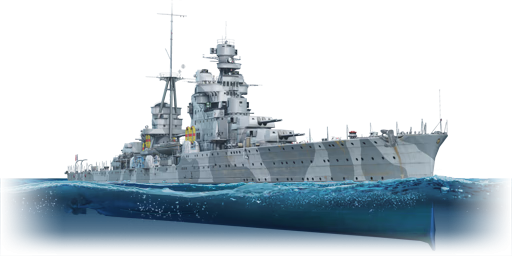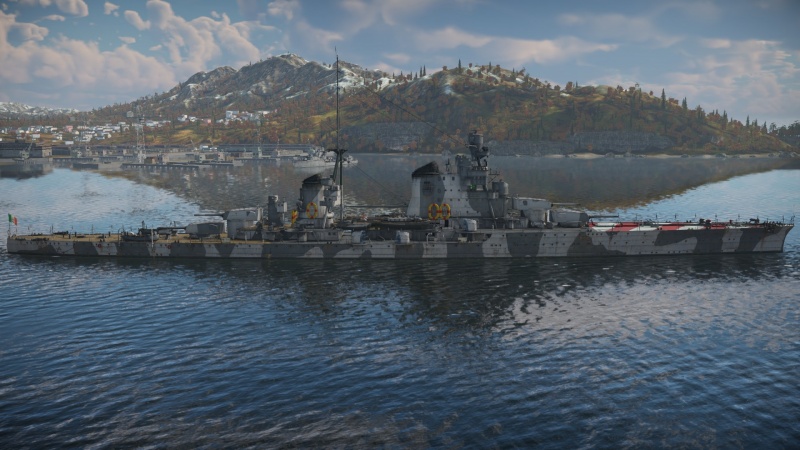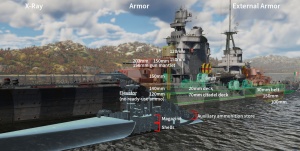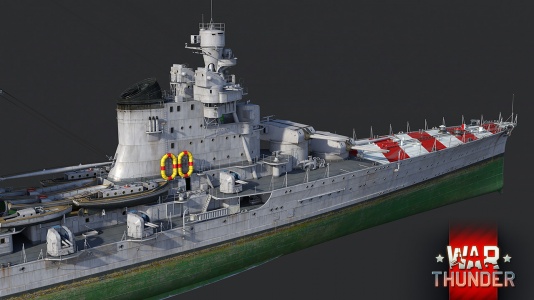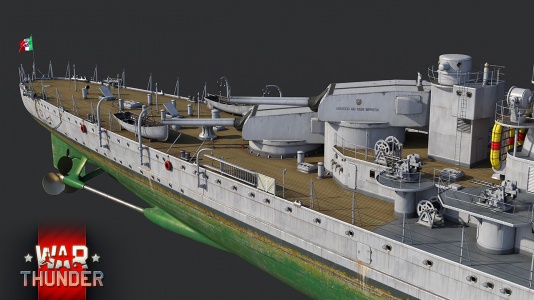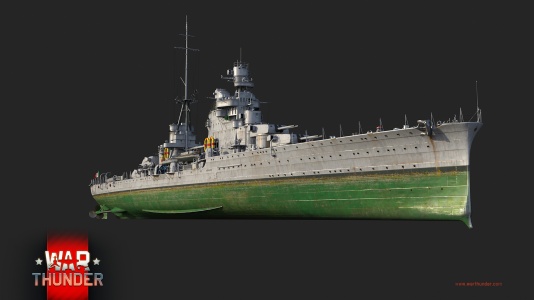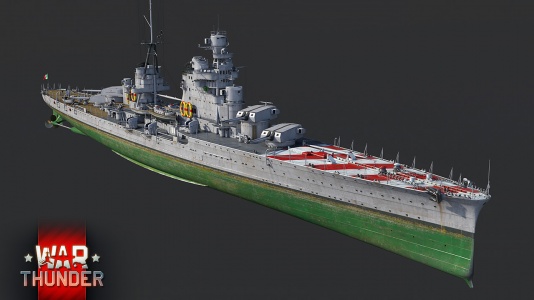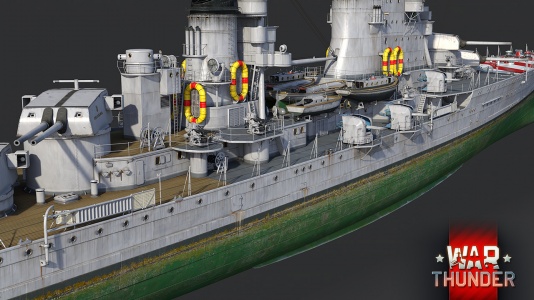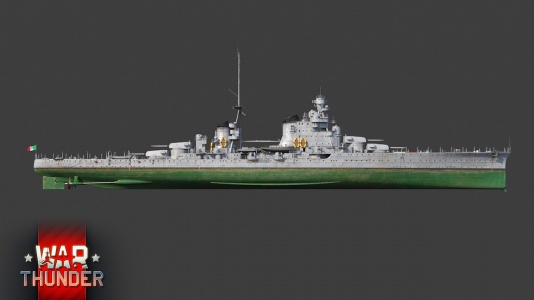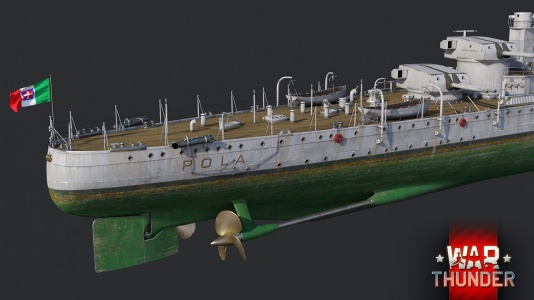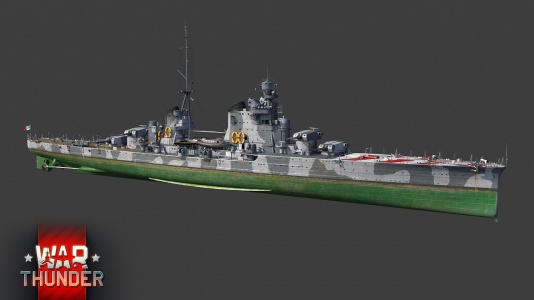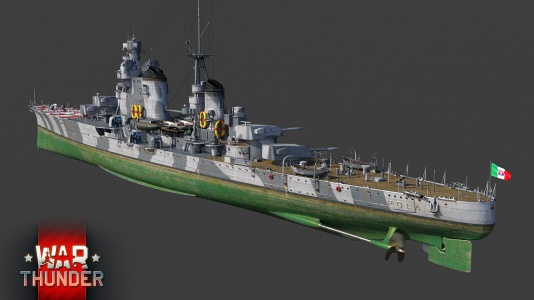RN Pola
Contents
Description
The RN Pola was the last heavy cruiser of the Zara class to be built. She was laid down on 17 March 1931, launched on 5 December 1931, completed and commissioned on 21 December 1932, and placed in the 1°Squadra Navale of the 1°Divisione. Between 1936-1937, she participated in operations. On 10 June 1940, the RN Pola was made flagship of 2°Squadra. She participated in the battles of Punta Stilo and Capo Teulada. In 1941, she carried out a raid south of Crete. During her return to Italy, she was attacked by British aircraft and sank on 29th March 1941 at 3:00 a.m., at 35° 15' N, 21° E.
Introduced in Update "Hot Tracks", Zara-class, RN Pola, 1941 is an excellent ship for researching the Italian bluewater tree. She is the premium version of the RN Zara, but in comparison has a more protected citadel due to the position of the citadel further down in the hull. The main armament is quite good and allows you to destroy enemy ships directly from their hold; however, due to the minimal explosive mass of the AP shells, experience in naval battles will be required to use them effectively against enemy weakpoints. The secondary armament and anti-aircraft are perfect for knocking out small naval targets and aircraft from medium and close ranges. The ship's manoeuvrability and speed allows you to dodge enemy shots and torpedoes, and she also proves to have excellent survivability against enemy cruisers, though you will still have to be careful of enemy battleships because thanks to their large calibre cannons.
General info
Survivability and armour
The Pola (along with her sister ship Zara) is one of the most heavily armoured cruisers in the game. When angled, her thick 150 mm main belt can shrug off anything short of battleship shells from medium to long range. Her engines and magazines are also protected by a 20 mm upper deck and 70 mm lower deck plate, the thickest of any cruiser in the game. The bow and stern ends of the citadel are protected by 120 mm plating, which is thicker than the belt armour on many other cruisers. The large bow also acts as spaced armour against torpedoes and during head-on engagements, thanks to the plane hangar and catapult.
The main gun turrets, sporting 203 mm faces and 150 mm elsewhere, are virtually immune to HE shells and quite resistant to cruiser SAP shells. The barbettes are also protected by 140-150 mm plates. The bridge is protected all-around by 150 mm thick armour and is a small target, making it very difficult to hit and disable. The steering gear is also protected by 20 mm plating.
Furthermore, the Pola also has a very large crew complement, especially compared to Allied and Japanese heavy cruisers, which further enhances her survivability. It is important to note that the ship has only two propeller shafts (most other cruisers have four), so losing one shaft will dramatically cripple the ship's mobility.
Mobility
Despite being a heavy cruiser, the Pola possesses great mobility for her class. The ship can accelerate and decelerate quickly, has a quick and responsive rudder, and a decent forward and great reverse speed. Albeit due to the low amount of shafts she has, the Pola runs the risk of losing half of her mobility output if one of them is disabled.
| Mobility Characteristics | |||
|---|---|---|---|
| Game Mode | Upgrade Status | Maximum Speed (km/h) | |
| Forward | Reverse | ||
| AB | |||
| Upgraded | 69 | 34 | |
| RB/SB | |||
| Upgraded | 59 | 29 | |
Modifications and economy
Armament
Primary armament
The Pola is armed with eight 203 mm/53 Ansaldo mod.1927 guns, distributed in four twin turrets, two in the bow and two in the stern. The guns have a relatively low rate-of-fire of only 3.8 rounds per minute, which is only slightly faster than the rate-of-fire of the American heavy cruisers. They can fire HE, AP, and HE-TF shells. These shells have a fairly high muzzle velocity (900 m/s) and good ballistics, resulting in relatively short shell travel times and fairly high penetration for the AP shell. Unfortunately, they also all have the lowest explosive fillers compared to those of other similar 203 mm guns, with only 7.5 kg of TNT for the HE/HE-DF shells, and 3.12 kg of TNT for the AP shells.
The main guns also have a fairly inconsistent dispersion, resulting in inconsistent salvos at long ranges. Sometimes they will produce a very tight spread, and at other times they will instead give a very large spread, straddling a target but not actually hitting it.
| Penetration statistics | |||||||
|---|---|---|---|---|---|---|---|
| Ammunition | Type of warhead |
Penetration @ 0° Angle of Attack (mm) | |||||
| 1,000 m | 2,500 m | 5,000 m | 7,500 m | 10,000 m | 15,000 m | ||
| HE Dirompente | HE | 58 | 58 | 58 | 58 | 58 | 58 |
| APHEBC Perforante | APHEBC | 388 | 327 | 247 | 189 | 148 | 105 |
| HE-TF Contro-aerea | HE-TF | 58 | 58 | 58 | 58 | 58 | 58 |
| Shell details | ||||||||||||
|---|---|---|---|---|---|---|---|---|---|---|---|---|
| Ammunition | Type of warhead |
Velocity (m/s) |
Projectile mass (kg) |
Fuse delay (s) |
Fuse sensitivity (mm) |
Explosive mass (TNT equivalent) (kg) |
Ricochet | |||||
| 0% | 50% | 100% | ||||||||||
| HE Dirompente | HE | 900 | 110.57 | 0 | 0.1 | 7.5 | 79° | 80° | 81° | |||
| APHEBC Perforante | APHEBC | 900 | 125.3 | 0.03 | 9 | 3.16 | 48° | 63° | 71° | |||
| HE-TF Contro-aerea | HE-TF | 900 | 110.57 | 0 | 0.1 | 7.5 | 79° | 80° | 81° | |||
Secondary armament
The Pola has twelve 100 mm O.T.O Mod. 1928 cannons as her secondary armaments. Mounted in three twin turret arrangements on the port and starboard sides of the superstructure. Although its performance were below average compared to its contemporaries, especially with its slow rate of fire of ~9 RPM (compared with ~15 RPM of other guns), it is still useful for dealing additional damage while the main gun is reloading.
The gun features three shell choices: a basic HE with an average 1.3 kg of TNT filler, an APHE shell with good filler for its calibre at 820 g of TNT but is largely ineffective beyond 5 km, and an HE-TF shell for anti-air purposes.
| Penetration statistics | |||||||
|---|---|---|---|---|---|---|---|
| Ammunition | Type of warhead |
Penetration @ 0° Angle of Attack (mm) | |||||
| 100 m | 1,000 m | 2,000 m | 3,000 m | 4,000 m | 5,000 m | ||
| HE Dirompente | HE | 17 | 17 | 17 | 17 | 17 | 17 |
| APHE Perforante | APHE | 150 | 129 | 109 | 93 | 78 | 67 |
| HE-TF Contro-aerea | HE-TF* | 17 | 17 | 17 | 17 | 17 | 17 |
| Shell details | ||||||||||||
|---|---|---|---|---|---|---|---|---|---|---|---|---|
| Ammunition | Type of warhead |
Velocity (m/s) |
Projectile mass (kg) |
Fuse delay (s) |
Fuse sensitivity (mm) |
Explosive mass (TNT equivalent) (g) |
Ricochet | |||||
| 0% | 50% | 100% | ||||||||||
| HE Dirompente | HE | 850 | 13.2 | 0 | 0.1 | 1,300 | 79° | 80° | 81° | |||
| APHE Perforante | APHE | 850 | 13.8 | 0.01 | 6 | 820 | 47° | 60° | 65° | |||
| HE-TF Contro-aerea | HE-TF* | 850 | 13.2 | 0 | 0.1 | 1,300 | 79° | 80° | 81° | |||
Anti-aircraft armament
The Pola features eight 37 mm Breda Mod.32 autocannons and eight 13.2 mm Breda Mod.31 machine guns as her anti-air armaments, mounted in four twin turrets mostly located around her second funnel, with an exception of a pair of 13.2 mm mounts between the 100 mm cannon mounts.
This anti-air defense is mediocre at best due to the low number of gun mounts, which is further exacerbated by its poor placement that prevents them from covering the bow of the ship, essentially making it a blind spot against aircraft. As such, it is recommended to stay with an ally with better anti-air coverage to minimize the risk of aerial attacks.
Scout plane
In the bow there is a catapult with one Ro.43 scout floatplane, a two-seater equipped with two fixed 7.7 mm machine guns and a single defensive 7.7 mm machine gun turret, but no bombs. It can land and capture points (but only while the aircraft is being controlled by the player) and can also lay down a smoke screen (up to 3 times).
Usage in battles
The Pola relies on using her heavy protection and good speed to close the distance with enemy ships and get into effective combat range. This is because of the temperamental salvo dispersion of her main guns, which makes her more inconsistent at long range shooting compared to other heavy cruisers. Her heavy turret, bridge, and belt armour make her a tough target for other cruisers (especially light cruisers) and destroyers to quickly disable or neutralise, especially at range.
However, because of the relatively small shell explosive fillers, low rate of fire, and small number of main guns, her damage output is on the low side, thus it is important to be careful when fighting other cruisers. Many of them have more guns and/or a higher rate of fire, and in a straight up close-range fight, they can out-damage the Pola over time. The Pola also does not carry any torpedoes for such fights, thus it is better to maintain some distance.
At its BR, the Pola can also face battleships regularly. In such matches, as with all cruisers, it is better to avoid fighting the battleships unless absolutely unavoidable, or if they are otherwise occupied by other ships and can be engaged with little to no risk.
The Ro.43 catapult seaplane provides some added flexibility to the Pola, allowing it to capture points that are otherwise not easily accessible to heavy cruisers, since they spawn farthest away from the capture points on Domination maps and generally do not have the best speeds. It can also be used to lay a smoke screen to cover the ship, which can be useful on maps where ships spawn out in the open.
Pros and cons
Pros:
- Thick belt armour, main gun turrets and bridge are also very heavily armoured
- Large crew complement further enhances survivability
- Great mobility, especially for a heavy cruiser
- Wide firing arcs on secondary armament
- Access to a scout seaplane
- Main armament has access to HE-DF shells for use against aircraft
- Ammo racks stored deeper below the waterline than on RN Zara, while having shell rooms and auxiliary ammunition below both: magazines and fire control rooms, making it very unlikely to suffer from ammunition blowout.
Cons:
- Lacklustre anti-aircraft armament (especially light anti-aircraft guns) that also has a deadzone across the bow
- Inconsistent salvo dispersion
- Crew is tightly packed inside the midship section, thus making them highly vulnerable against concentrated fire
- Small explosive fillers in both HE and AP shells for the 203 mm guns
- Has only two propeller shafts (losing one cuts half the power output)
- Low damage output over time due to long reload, small shell filler, and having only eight barrels
- Can be matched against battleships
History
The RN Pola was the last ship of the Zara class to be built, laid down on 17th March 1931, and completed and put into service on 21st December 1932. Unlike the other Zara-class cruisers, the Pola had a lengthened construction of the deck to increase the operational capacity of the ship. The ship cost a total of 114,700,000 Lire (about 59,237,606 Euro nowadays).
Service
The Pola mainly carried out normal squadron training and patrol activities in home waters and the Mediterranean basin until Italy intervened in World War II. Between 1936-1937, she was employed in the operations of the Spanish War, as part of the 1°Divisione of the 1°Squadra Navale.
On 10th June 1940, the Pola was made flagship of the 2°Squadra, raising the insignia of Squadron Admiral Riccardo Paladini. She participated in the battle of Punta Stilo from the 7th to 9th July, opening fire on the British naval and air forces. From 30th July to 1st August, she was part of the indirect escort to two convoys headed to Tripoli and Benghazi, together with the other cruisers of the 1st Division. During the battle of Capo Teulada on 27th November, she fired 118 rounds of 203 mm. While in Naples on 14th December, the Pola was hit by an enemy air attack on the port. Two air bombs that seriously damaged the ship, after 2 days she was docked for repairs.
Between 26th and 29th March 1941, the Pola participated in the incursion south of Crete, which led to the clashes between Gaudo and Matapan. During the return route, on the evening of 28th March, she was suddenly hit and immobilized by a torpedo dropped by enemy aircraft. Left isolated and immobilized, the other two cruisers of the 1st Division, RN Zara and RN Fiume, came to her rescue; however, they were destroyed in a surprise attack by British ships. As the RN Pola witnessed the end of its Division, she was finally discovered by the British ships; being already on the way to sinking, she was assisted by the destroyer HMS Jervis, command ship of the Fourteenth Flotilla, which recovered all the personnel of the Italian cruiser, and accelerated the sinking shortly after with torpedoes, one from HMS Jervis and one from HMS Nubian.
The RN Pola completely sank on 29th March at 3:00 a.m., at 35° 15' N, 21° E.
During her service, the Pola carried out twelve missions, 8 searching for the enemy, 3 escorting, 1 protecting minelayers. She travelled 13,174 miles for 611 hours of motion, consumed 8,813 tons of fuel oil, and was inactive for only 57 days.
The ship was officially struck off on 18th October 1946.
Devblog
Pola was laid down at the OTO Shipyard in Livorno in March 1931 as the last of the four Zara-class heavy cruisers. Following the class' nomenclature, Pola was named after a former Austro-Hungarian coastal city (today Pula, Croatia) which was annexed by Italy following the end of WWI. Pola's design remained virtually identical to the other ships of the class. However, as Pola was intended to act as a flagship, it received a larger bridge superstructure in order to accommodate the additional staff. This, as well as the missing 'carved out' sections of the hull sides below her bridge, distinguish her from other ships of the class.
Pola was launched in December 1932, and after only a brief fitting out period, was officially commissioned into service with the Regia Marina in the same month. In the interwar service period, Pola took part in two fleet reviews and participated in Italian non-intervention patrols during the Spanish Civil War along with other members of her class. Prior to the outbreak of WWII, Pola supported Italian ground forces during the occupation of Albania in April 1939.
During 1940, Pola frequently operated with her sister ships in concert with other elements of the Italian navy and engaged in a number of clashes with the Royal Navy in the Mediterranean. Pola was docked at Taranto during the devastating British air raid in November 1940, but unlike many other Italian warships present there, survived the attack unscathed.
After engaging British forces in the Battle of Cape Spartivento in late November, Pola found itself once again under air attack while in port at Naples. This time however, the ship did suffer minor damage and had to be drydocked for repairs until February of the next year.
After leaving drydock, the first major operation in which Pola took part was the Battle of Cape Matapan in late March 1941. It would also become the last battle, not just for Pola, but also for two of her sisterships - Zara and Fiume. Originally, the operation saw the assembled Italian fleet under the command of Admiral Angelo Iachino intercept a British convoy south of Crete. Pola was successfully torpedoed by British aircraft launched from HMS Formidable, quickly losing all power.
With Pola dead in the water, the Italian admiral ordered Zara, Fiume and a handful of destroyers to assist Pola later that night, however, unknown to the rescue party assembled around Pola, the superior British fleet closed in on them under the cover of darkness and guidance of radar to within point blank range before opening fire. The resulting naval engagement saw the destruction of mostall Italian warships present with heavy losses of 2303 dead and 1411 captured. After the brief battle, Pola, still afloat, was boarded by British sailors who searched the ship for valuables, taking her remaining crew as prisoners. In the early morning hours of 29 March 1941, the stricken Pola was torpedoed by the destroyer HMS Nubian, ultimately sealing her fate.
Media
- Skins
- Images
- Pola Devblog Images
See also
External links
| Odero-Terni-Orlando Company | |
|---|---|
| Destroyers | |
| Turbine-class | RN Turbine · RN Aquilone |
| Dardo-class | RN Dardo |
| Soldati-class | RN Corazziere · RN Aviere · RN Geniere |
| Comandanti Medaglie d'Oro-class | RN Comandante Margottini |
| Light Cruisers | |
| Condottieri-class | Kerch* · RN Duca degli Abruzzi |
| Capitani Romani-class | RN Attilio Regolo · Guichen** |
| Heavy Cruisers | |
| Trento-class | RN Trento |
| Zara-class | RN Zara · RN Pola |
| Battleships | |
| Conte di Cavour-class | RN Leonardo da Vinci*** |
| Export | Tashkent**** |
| See Also | OTO Melara |
| *RN Duca d'Aosta before war reparation to the USSR | |
| **RN Scipione Africano before war reparation to France | |
| ***Previously ‘’Cantieri navali Odero’’ in Genoa-Sestri Ponente | |
| ****Built for the USSR | |
| Italy heavy cruisers | |
|---|---|
| Trento-class | RN Trento · RN Bolzano |
| Zara-class | RN Zara · RN Pola |
| Italy premium ships | |
|---|---|
| Motor torpedo boats | Freccia P-493 · MAS 569 · MS 444 · MC 485 |
| Motor gun boats | Sparviero |
| Sub-chasers | Folaga |
| Destroyers | RN Aquilone · RN Aviere · RN Geniere · RN Tigre · Geniere |
| Heavy cruisers | RN Pola |
| Battleships | RN Leonardo da Vinci |


